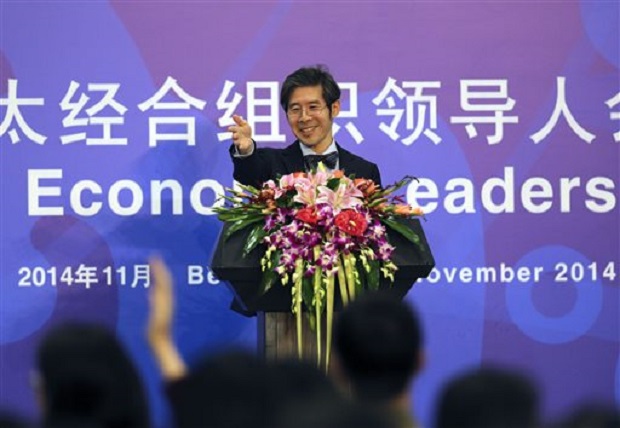Chinese, Japanese foreign ministers meet at Apec

Japan’s Foreign Ministry spokesperson Ken Okaniwa gestures as he takes questions from reporters during a press conference at the China National Convention Center in Beijing, China Friday, Nov. 7, 2014. AP
BEIJING, China—The foreign ministers of China and Japan held talks Saturday ahead of a hoped-for meeting between Chinese President Xi Jinping and Japanese Prime Minister Shinzo Abe after more than two years of frozen high-level contacts.
Tensions between Asia’s two biggest economies over a set of uninhabited islands have sparked air and sea encounters that have raised regional security concerns, and this coming week’s Asia-Pacific Economic Cooperation summit is seen a chance to dial down the friction.
Japanese media reports quoted Japanese Foreign Minister Fumio Kishida as saying he asked his Chinese counterpart, Wang Yi, to arrange a meeting between Xi and Abe at the APEC summit on Monday and Tuesday. Kyodo News agency said a meeting had yet to be finalized.
The talks between Kishida and Wang mark the first time foreign ministers from the sides have met since September 2012. The talks came a day after the sides issued a joint statement saying they’d agreed to gradually resume political, diplomatic and security dialogues. China froze high-level contacts amid the island dispute and other contentious issues.
Friday’s statement noted that the sides acknowledged their “different positions” on the islands, called Diaoyu by China and Senkaku by Japan. Although Japan has refused China’s demand to acknowledge that the islands’ sovereignty is in dispute, the statement indicated that Tokyo was at least willing to concede that different views exist.
Article continues after this advertisementAsked earlier Saturday to confirm an Abe-Xi meeting, Wang demurred, but said China expected Japan to hold to the spirit of Friday’s statement.
Article continues after this advertisement“We hope that the Japanese side will treat this consensus seriously, faithfully implement its commitment and create the necessary favorable atmosphere for a meeting between the two leaders,” Wang told reporters.
Also in Beijing, U.S. Secretary of State John Kerry said Washington welcomed the improvement in bilateral ties, but said rebuilding the relationship would take time.
“We think that any steps that the two countries can take to improve the relationship and reduce the tensions are helpful not just to those two countries, but it’s helpful to the region,” Kerry said.
The China-Japan statement said the sides agreed to hold dialogue and consultation to prevent the island dispute from further deteriorating and to establish crisis management mechanisms.
China was incensed by Japan’s move to nationalize the islands in 2012, sparking violent anti-Japanese protests and prompting it to send patrol boats to confront Japanese coast guard vessels in the surrounding waters. China also strongly objected to a visit last year by Abe to Tokyo’s Yasukuni Shrine, which honors the nation’s war dead, including executed war criminals.
China has been pushing for a commitment from Abe not to visit Yasukuni, which it sees as a monument to Japan’s 20th century aggression against China and other Asian nations.
Along with sparking fears of an armed confrontation, the dispute has been blamed for an almost 50 percent reduction in Japanese investment in China during the first half of the year.
RELATED STORIES
Apec preparations: China bans burning clothes of dead